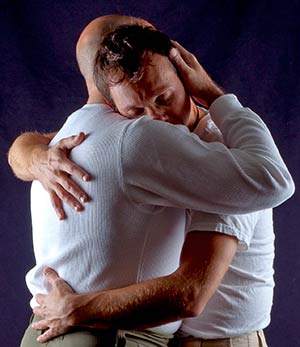TOUCH: A BEAUTIFUL AND SUPPORTIVE GIFT
by Kevin Smith

 Warm, friendly non-sexual touch has profoundly positive chemical, emotional and relational impact on human beings. It causes drops in the level of the stress hormone cortisol, slows down the heart, and lowers blood pressure. It increases levels of the hormone oxytocin— also called the “cuddle hormone”— allowing us to build trusting relationships with each other. According to Matt Hertenstein, an experimental psychologist at DePauw University, “oxytocin is a neuropeptide, which basically promotes feelings of devotion, trust and bonding…. It really lays the biological foundation and structure for connecting to other people.” READ MORE >>
Warm, friendly non-sexual touch has profoundly positive chemical, emotional and relational impact on human beings. It causes drops in the level of the stress hormone cortisol, slows down the heart, and lowers blood pressure. It increases levels of the hormone oxytocin— also called the “cuddle hormone”— allowing us to build trusting relationships with each other. According to Matt Hertenstein, an experimental psychologist at DePauw University, “oxytocin is a neuropeptide, which basically promotes feelings of devotion, trust and bonding…. It really lays the biological foundation and structure for connecting to other people.” READ MORE >>
If we’re lucky, we get warm, healthy touch from many sources: parents, friends, teachers, massage and physical therapists, dance partners, and lovers. It’s a natural thing: we’re literally born needing and craving touch. Babies who are not held enough can face serious developmental difficulties. But men, particularly American men, face a serious challenge when it comes to non-sexual touch: many of them stop touching in a friendly, affectionate and cuddly way during adolescence. And according some research, it is because they’re afraid of being seen as gay.
In a recently published article in the Christian Science Monitor, sociologists Barrie Thorne and Zella Luria noticed that kindergartners and first-graders hugged, joined arms, and held hands. But by fifth grade, boys had forsaken these customs in favor of mock violence— poking, pushing, and shoving— or ritual gestures like high-fives. Why? As they got closer to puberty, the boys began to use homophobic epithets— homo, queer, and especially fag— to demean each other. So they couldn’t risk bringing those labels onto themselves. “As ‘fag’ talk increases, relaxed and cuddling patterns of touch decrease,” Thorne and Luria wrote.
This tendency of modern-day men to avoid touching each other, making ourselves vulnerable, or sharing affection and emotions sharply contrasts with the way in which we used to support each other physically and emotionally in early times. The CSM article continues, “in the nineteenth century, American men declared their love for each other in fiction, poetry, and song. And you can see it in photographs from the period as well, which show men posing in physical embrace— sharing a chair, holding hands. All of that began to change in the early 20th century, when new fears of “feminization” started to drive men apart. Educators began to emphasize competitive sports, especially football, which would restore the nation’s endangered masculinity. And they also warned about “sissies” or “fairies, ” which in turn led men to turn away from each other.”
The 1950’s ratcheted up the way in which men guarded themselves physically and emotionally when anti-communist Joseph McCarthy suggested that gay men were often Communists as well. “Psychologists warned against overprotective mothers, whose worries and anxieties would supposedly render their sons into homosexuals. The boys heard the message, of course, distancing themselves from each other. And you can hear the message still, at any school or playground, where they call each other homo, fag, or queer. That hurts the gay kids most of all… But it hurts the rest of us, too, by limiting the ways that men can act and feel,” concludes the Christian Science Monitor.

 In my practice, I have come to see that many men who have no interest whatsoever in exploring other men sexually still need warm, supportive, caring relationships with other men. We need affection from each other (regardless of orientation). Many men of all orientations want some sort of caring touch that doesn’t involve sex, but something more than a high-five or a slap on the back. We need to be able to be emotionally open to each other, vulnerable, mutually supportive, caring.
In my practice, I have come to see that many men who have no interest whatsoever in exploring other men sexually still need warm, supportive, caring relationships with other men. We need affection from each other (regardless of orientation). Many men of all orientations want some sort of caring touch that doesn’t involve sex, but something more than a high-five or a slap on the back. We need to be able to be emotionally open to each other, vulnerable, mutually supportive, caring.
My experience of literally hundreds of hours spent holding men— identifying themselves as “straight”, “gay”, “bisexual”, or “queer”— is that those labels are largely irrelevant to the practice of supportive, non-sexual connection to each other. The capacity for emotional (and non-sexual) intimacy with each other, for vulnerability and supportive empowerment is fairly constant, in my experience, regardless of orientation. And it is a beautiful and supportive gift we can offer each other, an alliance we need, and a brotherhood we deserve.



